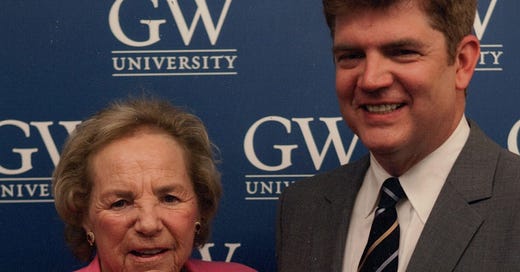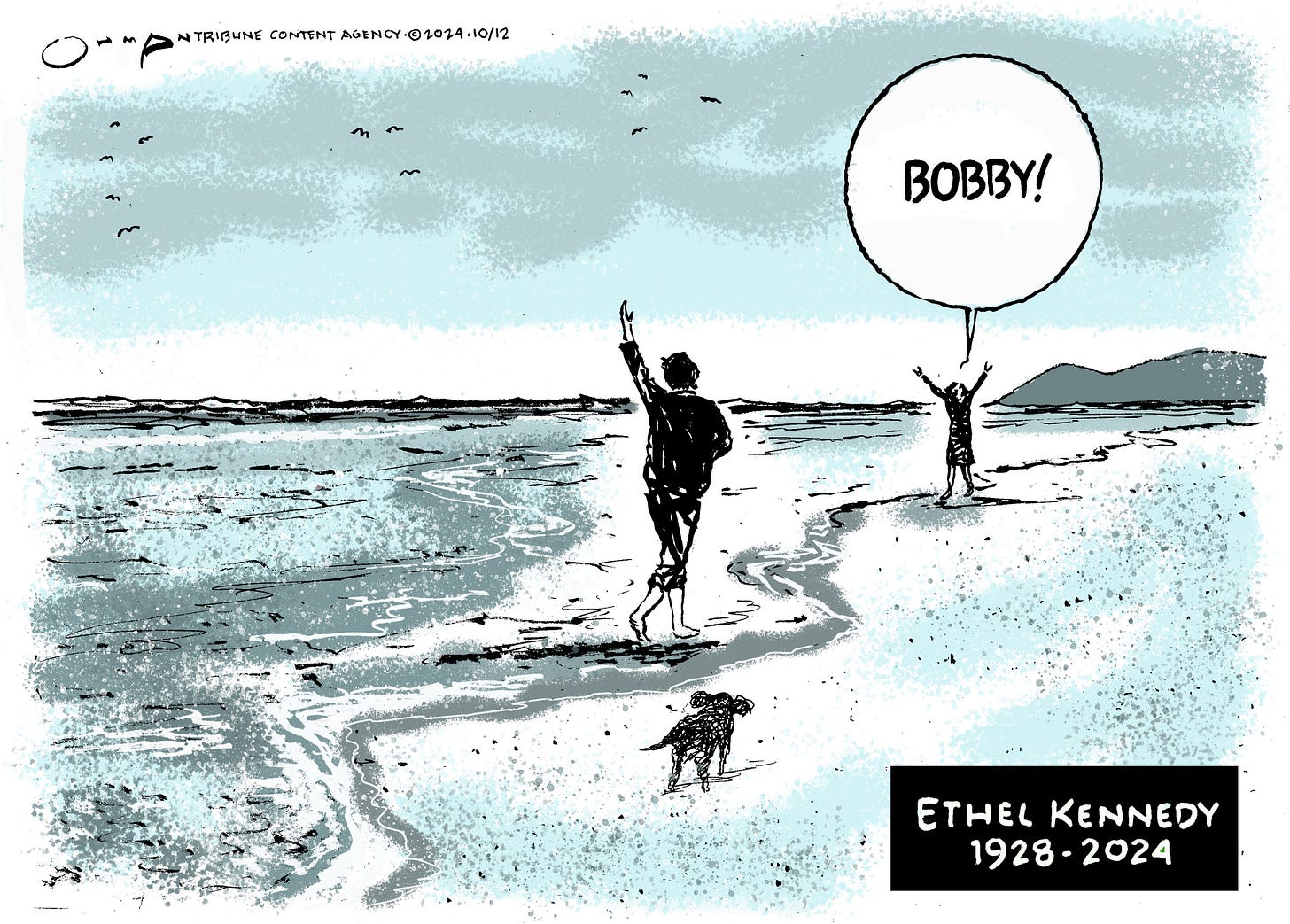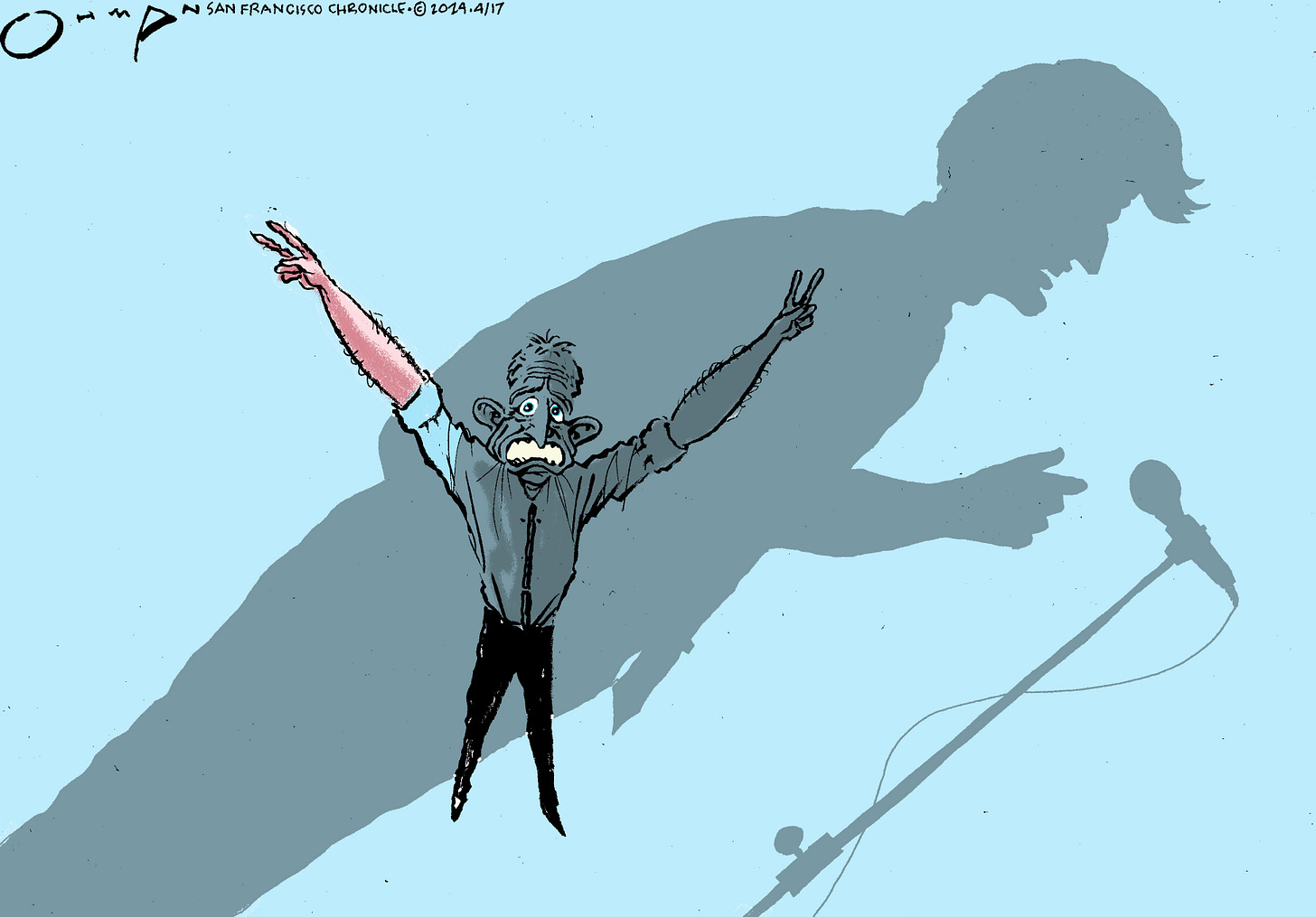Ethel Kennedy as American political metaphor
Her death at 96 closes an optimistic chapter in American history
Me with Ethel Kennedy in 2009. I had just won the Robert F. Kennedy Journalism Award. She was inquisitive and gracious with me and everyone else there.
For people of a certain age, maybe over 65 but probably closer to 70 now, the death of Ethel Kennedy at 96 closes the book on an era.
She didn’t preside over that era—her late husband, Sen. Robert F. Kennedy, assassinated in a kitchen pantry at the Ambassador Hotel in Los Angeles in 1968—did, as well as her brother-in-law, the late President John F. Kennedy.
When I heard the news of her passing, of course I watched the news clips of her from six decades ago, and felt, well, old.
Bobby Kennedy was only 42 when he died—42! My God—and his only surviving brother, Sen. Edward M. Kennedy, carried on as best he could, but, in the words of the late Sen. Lloyd Bentsen, “you’re no Jack Kennedy”. This brutal putdown of Sen. Dan Quayle in the 1988 Vice Presidential debate applied to Ted, who was indeed a great United States Senator, but this burdened youngest child could not translate the 1960 magic into 1980 votes.
There is an iconic photo of the Kennedy family on the morning after the 1960 election, standing in their Hyannisport living room, beaming and looking like they were about to switch into their sweatshirts and shorts and play touch football. All are now gone, save Ted’s first wife, the fragile Joan Bennett Kennedy.
“We are all mortal,” JFK intoned at his 1963 American University speech, and he was right.
When I drew an obituary cartoon celebrating Ethel Kennedy, I have to admit that I was choked up while drawing it. Not because I was so touched by my own artistry, but that it reminded me of when America, in many ways, was, in fact, great. It wasn’t great for Blacks, nor was it great for most minorities, but it was a signal moment that the country did give a damn about what happened to them. JFK, in particular, was inspirational in a way that no future president could match. President Barack Obama came closest, and he was indeed inspirational for a generation of Americans, but he symbolized the culmination of the Kennedy vision: a black man (or woman, God willing), can make it.
Bobby Kennedy said in 1966 or so that he expected a black man would be president in 40 years. This long-forgotten clip was prescient, but there was also an asterisk: Trumpism.
America is still riven by racial division, and Trump exploits it daily with Nazi-inspired rhetoric. The torch was passed, and we dropped it and set the country on fire.
The Kennedy Moment made America a scientific and human rights leader, and even some Republicans, a party exemplified by Abraham Lincoln (for awhile), but now it’s the party of Jefferson Davis, went along.
Far too many people kept wanting to reset us back to American apartheid, not American renaissance.
Who are they?
Fearful and forgotten, many were indeed left behind. They react instead of analyze, they scream instead of listen, and they consistently vote against their own interest, paralyzed by anger.
JFK and RFK were not angry men.
To be sure, President Kennedy slow-walked civil rights until June, 1963: he and Lyndon Johnson were vote-counters, not posturers. When JFK was murdered for no explicable reason by a small man with a mail order Italian rifle, Johnson managed a true American revolution that Kennedy couldn’t politically enact.
Even Johnson’s massive legislative achievements were eclipsed by his mishandling of the Vietnam War, which ignited a counter-cultural revolution we still see today, faint but perceptible.
A left-wing fear of government overreach became a right-wing death march toward authoritarianism.
Influenced by his father, Bobby Kennedy started his career as a young anti-communist, and worked alongside people like Joseph McCarthy and Roy Cohn, who later became a spirit animal to Donald Trump. Because it has been so long ago, you rarely hear the phrase McCarthyism now, but that’s exactly what Trumpism is: smash and grab, spew the Big Lie, smear your opponents, and let the glass shatter and the blood seep into America’s soul.
Later, as he aged and his brother died, he became repentant and introspective, transforming into America’s greatest empath. No one has given a better political speech since Robert Kennedy stood up in Indianapolis, hours after Martin Luther King Jr.’s death, and gave the most heartfelt political speech ever. No question. Bobby Kennedy became obsessed with poverty in America, and, when he died, he had created a fascinating coalition; the white working class and minorities.
Where is that coalition today?
You know that answer.
As in 1961, we now have a Catholic president, and it is utterly unremarkable. His 2020 opponent doesn’t know Corinthians from a con job.
Of course, much of the Kennedy mythology is just that, and yet it endures. Yes, President Kennedy had affairs. No doubt, and a few were massively inappropriate. In contrast, Trump is a beauty pageant creep show, a convicted sexual predator, and buried his own wife on a golf course tee box to get a tax abatement.
The Kennedys were indeed media conscious, but even JFK suggested he should warm up his own detached demeanor for 1964. The Kennedy first family was a movie set with beautiful actors and actresses, and they knew it. Camelot was a contract, not reality.
My own father, an Eisenhower Republican of his era, even admitted that as a young government research scientist, he knew that Kennedy was something special: he made government service cool, and science a national priority.
Trump? Every scientist is wrong and/or corrupt, except for the mental meanderings of a self-described “very stable genius”. Now his—yes, it is his—Project 2025 calls for the defunding of NOAA, and his kooky choir says that the weather can be manipulated.
The American people seem deeply divided on what they’ll accept, but one thing is clear: if Obama had conducted himself like Trump on any level, the pious GOP would sound the alarm first and ignore the adjudicated rapist at the top of their pathetic, unqualified, mentally ill ticket.
As Ethel Kennedy faded, her own son and namesake of his brilliant father betrayed their legacy. Did he shatter it? Not exactly, but he spray-painted obscene graffiti on it for years. For older Americans, they know what Jack and Bobby were like; for this generation of Americans, the Kennedy name is now a part of ancient history, like the Roosevelts or the Rockefellers.
This is why Ethel Kennedy’s passing is so poignant; she tried so hard to maintain her husband’s vision, and her crazy son managed to define it not only downward, but set it off on a bizarre tangent that may never be fully recovered.
Still, her life is worth remembering and celebrating. One way to honor her would be to cast a vote for a black woman for president of the United States.
**********************
Dear friends: Thank you so much for subscribing to You Betcha! I cannot possibly tell you how much your subscriptions, free or paid, mean to me. It has lightened my load enormously, emotionally and financially. If you can see the way forward to a paid subscription, I will be in your debt, and I will work very hard to maintain your trust in my mission here.







Jack, I have loved not only your artistic ability, but your wordsmith capabilities for a long time. Today's piece on Ethel Kennedy was my favorite! (and I'm not even Catholic)
You're reminding me of the 2 best books I've listened to recently. Halberstam...The Fifties. and Doris Kearns Goodwin...An Unfinished Love Affair. The first for insights into the 50's; the second for the 60's. If you haven't read them, you would enjoy doing so.